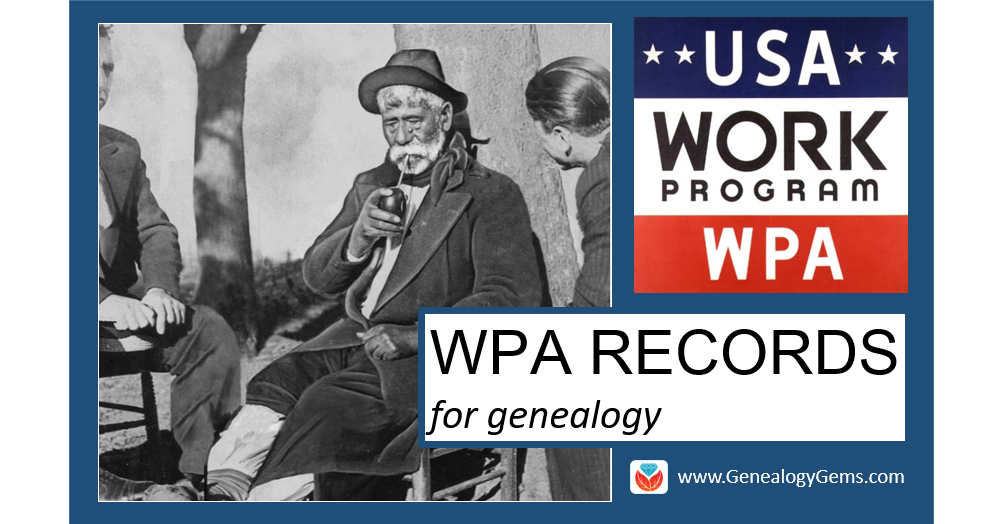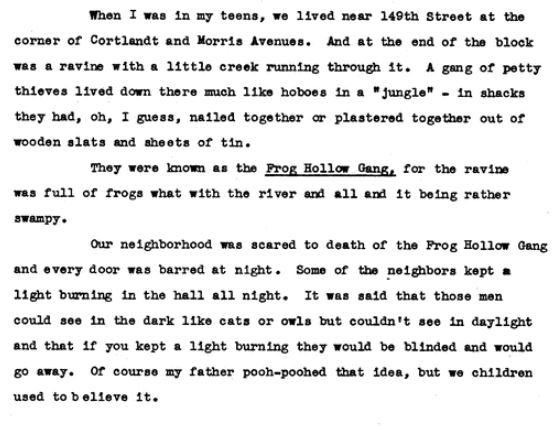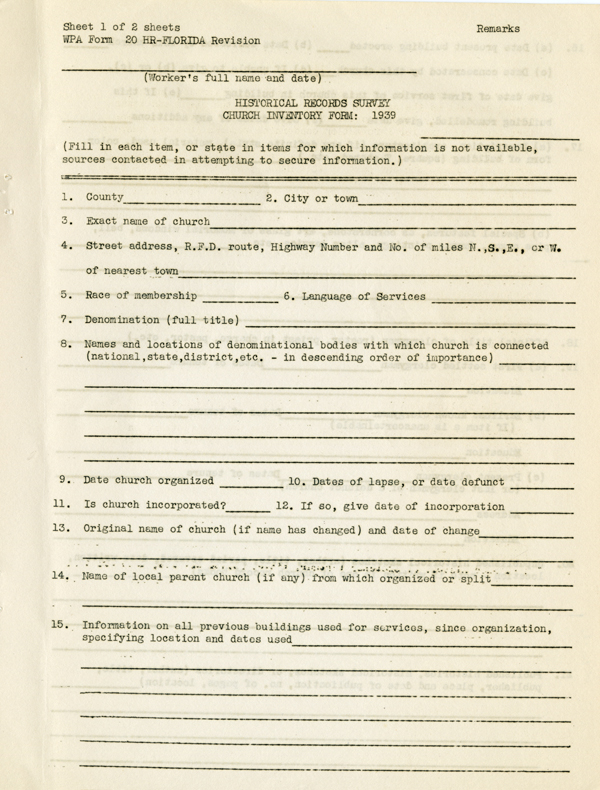Have you used WPA records for genealogy? Their Historical Record Surveys and local and oral histories may help you in your family history research. Existing records and locations vary widely. Here are tips to help you in your search.

In the late 1930s and early 1940s, employees of the Works Progress Administration (WPA, also known as the Works Projects Administration) created new resources for U.S. genealogical research. It’s possible you’ve even consulted some of these without being aware of their WPA origins. After all, the projects and their formats varied. They didn’t always prominently credit the WPA and some were printed long afterward. We’re going to shine the spotlight on WPA-era local histories, oral histories and statewide Historical Record Surveys.
WPA Records for Genealogy: Local Histories
 In Annie Barrows’ novel The Truth According to Us, Layla Beck heads to the small fictional town of Macedonia, West Virginia to write a local history as a WPA assignment. Drama ensues, both in Layla’s personal life and as she tries to learn local stories, which everyone reports a little differently. (We featured this book in the Genealogy Gems Book Club.)
In Annie Barrows’ novel The Truth According to Us, Layla Beck heads to the small fictional town of Macedonia, West Virginia to write a local history as a WPA assignment. Drama ensues, both in Layla’s personal life and as she tries to learn local stories, which everyone reports a little differently. (We featured this book in the Genealogy Gems Book Club.)
Actually, local histories were written as WPA projects. Their scope, topics, and formats varied, depending on the unique background and resources of each region and how active WPA workers were in each state and county. For example, WPA historical materials in Morrison County, Minnesota include “histories on townships, cities, churches, schools, businesses, the military, and miscellaneous county history topics,” which have since been collected and reprinted by the county historical society. Many historical projects included photographs, such as this one for the city of New Orleans.
WPA Records for Genealogy: Oral Histories
WPA workers also captured oral histories of individuals, too. Many were collected in American Life Histories: Manuscripts from the Federal Writers’ Project, 1936 to 1940, now online at the Library of Congress. According to the collection description, “The documents chronicle vivid life stories of Americans who lived at the turn of the century and include tales of meeting Billy the Kid, surviving the 1871 Chicago fire, pioneer journeys out West, factory work, and the immigrant experience. The documents often describe the informant’s physical appearance, family, education, income, occupation, political views, religion and mores.”
Other important WPA oral histories are narratives of former slaves and their families. You can browse an enormous collection of these online at the Library of Congress. These aren’t the ideal eyewitness accounts we wish for, as they were gathered so long after the end of slavery, from many who were young children at the time. Also, many researchers believe interviewees may not have spoken candidly, especially to white interviewers who may have known them personally.
It’s a long shot to find an ancestor mentioned by name in WPA oral histories. In some instances, pseudonyms were even used for names and places. But, you can still learn a lot from others’ descriptions of daily life and unusual events your ancestors may have experienced.

From one of the slave narratives mentioned in this article.
Historical Record Surveys
The Historical Record Surveys created by the WPA are among the most genealogically-valuable of their projects. “Under the auspices of the WPA, workers went to archives, historical societies, public and university libraries, and compiled inventories of manuscript collections,” writes Bryan Mulcahy in an online report. “They went to courthouses, town halls, offices in large cities, and vital statistics offices and inventoried records. Besides compiling indexes, they also transcribed some of the records they found.”
Today, many of their efforts still exist. They include indexes to cemeteries, newspapers, and naturalization records, as well as inventories of courthouse records, church records, and other manuscript collections in various archives or libraries. Of course, some records may have been moved or destroyed since inventories were created, but knowing what records existed around 1940 and what they were called may help you locate surviving collections. Some indexes, such as those of cemetery tombstone inscriptions, may actually be more valuable since they captured information from tombstones that may no longer exist or be legible.

A blank WPA Historical Records Survey church records inventory form. Image courtesy of the State Archives of Florida. Click this image to find it online at Florida Memory.
One great example is the Historical Records Survey for the state of Oregon, described as “the most comprehensive documentary project of Oregon history and related records of its time.” It includes historical essays, document transcriptions, interviews, research notes, photographs, pamphlets and more. According to its collection description, “The territorial and pioneer periods of the mid-to-late nineteenth century receive the greatest attention, with an emphasis on the growth of state government and infrastructure, business and agriculture, transportation, education, biography, and relations between social groups. Native Americans figure prominently in this collection.”
Finding WPA Records for Genealogy Online
Some WPA projects were carried out on a federal level and others by state agencies. They were never centrally published or collected. Today, surviving original files and published volumes are scattered across the country. Some can be found in the National Archives, many in state libraries or societies, and many more available at local repositories.
A Google search such as historical records surveys and the name of the state and/or county is a great way to start your search for WPA records for genealogy research. Some results will lead right to the kinds of resources you want, such as this guide to WPA records in archives in the Pacific Northwest. Others, such as this one for the Iowa Historical Records Survey published in The American Archivist, are mostly a history of the effort. However, they do contain several useful bibliographic citations to records that were created. Add the name of the county to your search and you may find more targeted results, such as this library catalog entry for the inventory of the Jasper County archives. Click here to learn more about Google searches for genealogy records you want to find.
Remember, though, that many WPA publications and collections aren’t identified as such. Don’t fixate on needing to find WPA listed in the title. Just concentrate your efforts on finding the local and oral histories, photos, historical record indexes and inventories, and other resources that may be out there. When you find one created during the Great Depression, you’ll know it may have been done by the WPA.
 Love what you’re reading and want to learn more? Go deeper into genealogy “gems” like these in Lisa Louise Cooke’s Genealogy Gems Podcasts. Lisa produces a free internationally-renowned monthly podcast that’s had over 2.5 million downloads! Additionally, Genealogy Gems Premium website members also have access to her full archive of monthly Premium podcast epidodes: check out a full description of these here including Episode 2 on WPA records for genealogy.
Love what you’re reading and want to learn more? Go deeper into genealogy “gems” like these in Lisa Louise Cooke’s Genealogy Gems Podcasts. Lisa produces a free internationally-renowned monthly podcast that’s had over 2.5 million downloads! Additionally, Genealogy Gems Premium website members also have access to her full archive of monthly Premium podcast epidodes: check out a full description of these here including Episode 2 on WPA records for genealogy.




